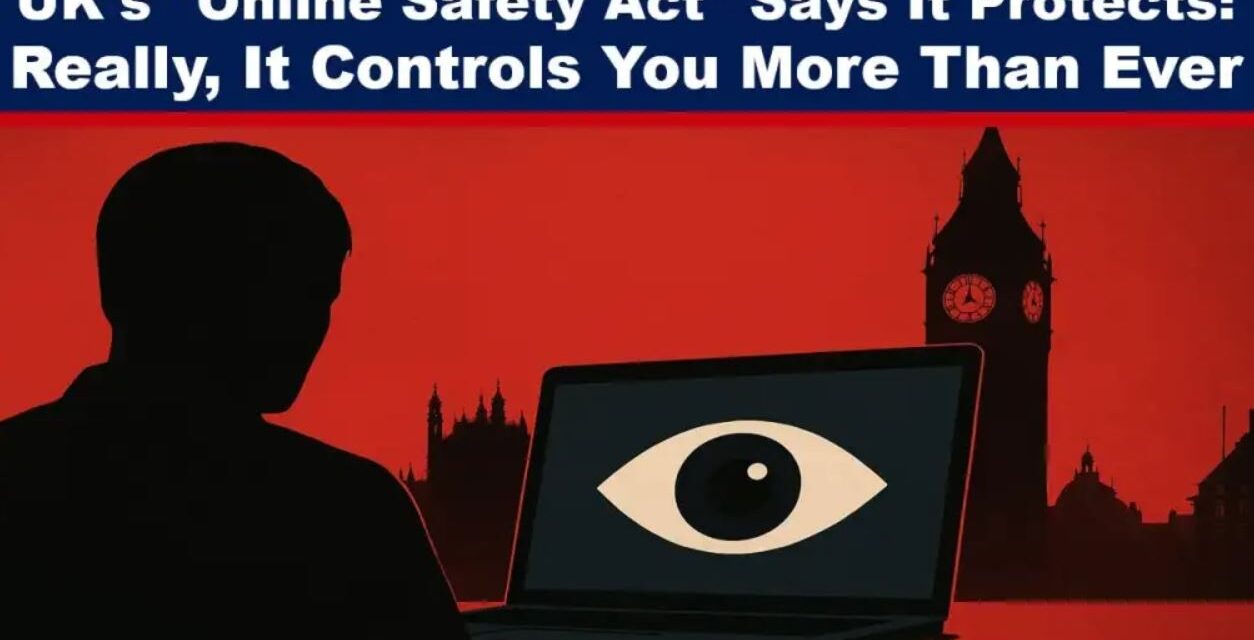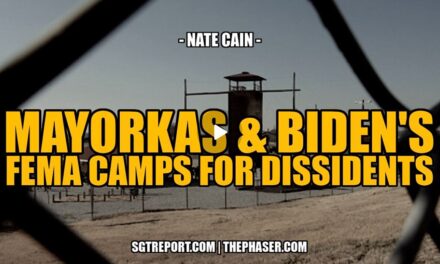In the UK, the Online Safety Act (OSA) was sold to the public as a way to shield vulnerable people from harmful content, and protect children from internet predators. It sounded like it would ensure a safer, more accountable online experience. The true motivation for its implementation is revealing itself, and is being met by waves of backlash – not only by privacy campaigners, but from regular internet users, tech professionals, artists, and whole sections of parliament. Hundreds of thousands have signed petitions, and legal challenges are underway.
Increasingly, then, the question is being asked: was this ever really about safety?

What This UK Law Actually Does
The OSA gives Ofcom (the UK’s communications regulator) unprecedented power over the country’s digital content. It now mandates that platforms proactively monitor, censor and remove any content it deems “harmful”, even if there’s nothing illegal about it. This includes, by increasingly blurry definitions, hate speech, misinformation and bullying – and can even introduce jailtime for companies failing to comply with them.
Among the most vocal opponents are the encrypted messaging apps, Whatsapp and Signal. The OSA means government regulators can compel these services to install backdoor services to scan the content of messages, which fundamentally undermines the core principle of their end-to-end encryption offerings. Any companies found refusing to comply may now be fined, blocked, or even criminalised. In short: the privacy we were promised is now being mandated against.
This Act also criminalises “unauthorised access” to online content, which critics say could affect basic functions like right-clicking certain things, viewing source code, or accessing archived information.
It’s legislation with sweeping intent, but vague definitions.
The Great Push Back
Over 300,000 people have already signed petitions demanding urgent reform, or total repeal, of the law. Tech experts have confirmed that it can potentially “break” the internet by requiring companies to do things that are either privacy-destructive, or technically impossible. Reform UK has vowed to repeal the Act totally if elected. Conservative MPs are seemingly split, with a growing number now expressing unease over the law’s scope and implementation.
Writers, artists, and musicians have criticised how the Act suppresses political or controversial content under the vague “harm” banner. Journalists say it’s threatening investigative reporting, academics say it will limit digital research and chill free speech, and cybersecurity professionals warn that the law undermines basic encryption, putting users at risk.
This has grown from being a fringe campaign to a nationwide, cross-ideology backlash.
When “Safety” Becomes Control
Public safety was the official justification for the Act, but critics argue that it’s another measure aimed to monitor and control what the public get up to.
This is particularly concerning when considering Ofcom’s granted power of encrypted platforms. It’s one thing for governments to demand the right to scan private messages in the name of “safety” – and it’s another to criminalise its refusal.
As The Critic said: the law is treating adults like disobedient children, and The Spectator compared the Act to internet regulation in authoritarian regimes. There’s a clear growing concern that the OSA is not a public safety measure at all, but is rather a tool to discipline the space and its users – an early step towards controlling what can be said, how, and by whom.
Why Now?
The UK is in a period of high public distrust of its government. There’s economic strain, mass migration, and generally volatile political sentiment. Online platforms are arenas in which dissent still finds traction, with articles being published, memes shared, and videos posted, expressing dissatisfaction with current events.
Public sentiment is poor in the country, and censoring how and where people can express these feelings – and even hiding the protests or demonstrations that showcase how the public is feeling – is not having the intended effect. It’s making people more outraged, not less.
The OSA, therefore, feels like a way of managing dissent under the guise of protection. Perhaps trying to fragment any political opposition to stop it becoming organised, and a way to throttle speech while telling people it’s for their own good.
Censoring the Edges
Under the Act, content deemed vaguely “harmful” – even if not illegal – is still subject to penalty. This can include political criticism, satire, and controversial opinions. Content moderation algorithms will now need to make moral judgements about what qualifies as emotionally or mentally damaging. These are systems that are already fallible. Will there be any oversight or appeal to these digital decisions?
For critics, this is where the law becomes dangerous. There is a blurry line between harm and offence, giving regulators the ability to redefine these terms as they see fit, with near-total discretion to remove or suppress content that deviates from their imagined centre. Online reactions display the thoughts of many:
“And there it is, the real reason for the OSA — the prevention of wrongthink. Can’t have the plebs thinking outside the status quo”
“Funny how gambling adverts on YouTube seem to be exempt.”
With the following also including the recent decision to lower the voting age in the UK:
“16-year-olds will be allowed to vote, but won’t be able to learn what is happening in their own country?”
“This blocks 16 year olds from seeing news footage from warzones. So now we’re in the place where they can vote for a party that wants to go to war but not view the consequences of that.”
Thoughts like these are being echoed nationwide. They are not put forward by fringe conspiracy theorists, but ordinary people trying to reconcile the contradiction between an open society and a closely controlled information architecture.
Public Mood & Rise of Reform UK
Reform UK, under the leadership of Zia Yusuf, has made repealing the Act a central plank of its campaign. Yusuf recently told supporters that the Act is a “borderline dystopian overreach” and a betrayal of democratic principle. His criticism taps into a broader frustration: that the people who supposedly serve the public no longer trust them to think, speak, or decide for themselves.
What makes the current backlash unique is how unifying it is. For once, tech libertarians, artists, and populists are on the same side. They all see the same threat: that this isn’t about safety at all. It’s about obedience.
Changing the Infrastructure of Speech
Laws like this change the way we operate. The internet is altered with friction rather than with force. Platforms pre-emptively remove content in anticipation of fines, journalists pause before publishing, whistleblowers go quiet, and the public learns to think twice before speaking to ensure they don’t get censored.
Final Thought
The Online Safety Act is the start of a new chapter in how speech is governed in the UK. And it’s clearly extremely unpopular with the public. If the goal is safety, then the government seems to have missed. If the goal is control, then it’s well on its way.
Is this about keeping children safe? Or has it far extended its reach to keep everyone in line?
Bitchute: https://www.bi,tchut,e.com/channel/YBM3rvf5ydDM/
Telegram: https://t.me/Hopegirl587
EMF Protection Products: www.ftwproject.com
QEG Clean Energy Academy: www.cleanenergyacademy.com
Forbidden Tech Book: www.forbiddentech.website













